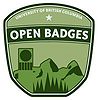Documentation:Open Badges/Learn/Where
Badging in academic environments can be complex as there are a variety of activities that occur on campus that support student and staff professional development and educational growth. Many of these activities are formalized within the university accreditation structure, such as coursework and degree programs, while other activities offer supportive services that enhance knowledge and skills to be successful in academia and beyond, such as research and writing services.
The following outlines the variety of badging program types and examples within educational settings.
Extracurricular Badging
An extracurricular badge reflects an activity that takes place outside a curriculum. These activities often are associated to an area of interest or a hobby. These badges provide social capital for an individual by providing a community to interact with that have similar interests. On an academic campus, extracurricular activities can include anything from involvement in a club to engaging in learning activities outside of the classroom that support an area of interest.
Extracurricular badges stand at a slight remove from the agendas of academics although they often are supportive of the soft skills and generalized knowledge needed for success in the larger education and employment environment.
|
Co-curricular Badging
A co-curricular badge reflects skills and knowledge that complements a formal curriculum.
Co-curricular badges require the identification of skills or knowledge needed to fulfill curriculum requirements but may not be a part of the overall assigned activities. For example, research skills, digital literacy, or community service activities may be skills required to complete course work but are not officially assigned or graded activities.
|
Curricular Badging
Curricular badges can be difficult to implement as they may be subject to a lengthy approval process from institutional bodies that oversee curriculum. Curricular badges are equivalent to a formal credential from an institution like UBC.
|

